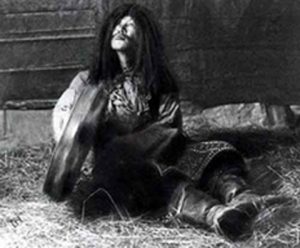
All time is fluid in human experience. At times, the minutes, hours, years fly by. At other times, they drag down the road like zombies. In our search for logic and meaning we measure time — from the billions of years it takes for light to travel from a distant galaxy to the time it takes light to travel to a teeny weeny Planck length, 10-33 centimeters. From quantum to cosmos, from boson particles to galaxies billions of years old, we can only measure time in terms of distance. How silly is that? I can’t imagine a miniscule Planck. I can’t grok[1] an immense light year.
We often measure time in terms of life: the turn of the seasons, spin of the constellations, the shortening of days, the life of a gnat, a coyote, my old cat Laura, our lives and how far away we are from death… whatever that is.
We can measure time in terms of history, which translates into a detailed catalog of cause and effect perpetrated by humans on themselves and the planet.
History and cosmology are at odds over time. On one hand, history tells us you can’t go backwards. The monstrosity of Vladimir Putin and his savage Czarist-cum-Cold War nostalgia demonstrates that. On the other hand, cosmology tells us you can’t go forward in time. All you can do is look back into old stars. It’s enough to drive a body to opioids. However…
I can get my head around time as tempo.
 Tempo is fundamentally profound and devilishly simple. Profound because it begins with the beating heart; simple because I don’t need to measure tempo in terms of distance. Forget about Plancks and light years. I don’t need to measure tempo in terms of history. People have been beating out rhythms forever. No, for tempo, all I need are three events.
Tempo is fundamentally profound and devilishly simple. Profound because it begins with the beating heart; simple because I don’t need to measure tempo in terms of distance. Forget about Plancks and light years. I don’t need to measure tempo in terms of history. People have been beating out rhythms forever. No, for tempo, all I need are three events.
Let’s use a handclap as an event. You clap; I listen.
If you clap once, I don’t have tempo. All I get is the clap [sic].
If you clap twice, I still don’t have tempo. When will the next clap occur? Who knows?
But if you clap three times with the same time interval between each event, you’ve established a pattern; you have the beginnings of a tempo.
Whoee! Let’s rock out.
We all know what tempo is: it’s rhythm. Humans got rhythm, animals got rhythm. Rhythm can become complex, full of syncopation and polyrhythms. It can vary widely from culture to culture. But we’ve already established that time is rudimentary — it lies at the heartbeat of human experience. Tempo, if you stay true to our first, three-clap experience and continue clapping, creates order, logic, stability. Until you willfully stop clapping, you are performing a predictable act.
 How do we know that tempo is fundamental to human experience? I like to use the example of shamen and shawomen. For Neolithic cultures (plant growers, gatherers), shamen practitioners use music to attract the gods to the land. In Yoruban cultures from the Niger (santaria in Cuba), the ritual leaders work with musicians, using particular rhythms to attract particular gods (orishas) who visit a gathering or individual. When a person becomes possessed by a god spirit, their guests have been attracted to the subject via rhythmic melodies and chants.
How do we know that tempo is fundamental to human experience? I like to use the example of shamen and shawomen. For Neolithic cultures (plant growers, gatherers), shamen practitioners use music to attract the gods to the land. In Yoruban cultures from the Niger (santaria in Cuba), the ritual leaders work with musicians, using particular rhythms to attract particular gods (orishas) who visit a gathering or individual. When a person becomes possessed by a god spirit, their guests have been attracted to the subject via rhythmic melodies and chants.
In Paleolithic cultures (hunters), the shaman must go hunting for the gods. They must travel to other realms to find the spirits they want to call upon. To avoid becoming lost in the spirit realms they depend — as did Jason with his golden thread — on a drummer who remains in the realm of the living, beating out a steady tempo like a string of beads that anchors the practitioner to the real world.
In these cases, time is everything. Tempo lies at the heart of time, and rhythm… well, hell, we all love rhythm. Roll over, Beethoven. Tempo sure beats counting the minutes while “time keeps on ‘slippin’, slippin’, slippin’ into the future.”[2]
# # #
[1]Grok. To understand something intimately and completely. (originally from Stranger in a Strange Land, by Robert A. Heinlein) Urban Dictionary
[2] Steve Miller Band, “Fly Like an Eagle”
Writer, editor, and educator based in Los Angeles. He's also played a lot of music. Degelman teaches writing at California State University, Los Angeles.
Degelman lives in the hills of Hollywood with his companion on the road of life, four cats, assorted dogs, and a coterie of communard brothers and sisters.



Wow Charles, thanx for your ever-unique take on our Time prompt and your wonderfully written story, once again taking me out of my ken.
And thanks for the vocabulary lesson – I’ll have to remember GROK for my next scrabble game!
Thanks, Dana. Glad I could carry you beyond the Dana L pale! Yeah, ‘grok’ is a bit arcane but it’s a very useful word. Scrabble away!
Wonderful, Charlie, I love how you describe tempo/rhythm in terms of claps (and I’m ignoring your joke about one clap). I’m also impressed with the way you created footnotes where the reader can click on the number and go to the footnote. That saves a lot of *time* so thanks for that. The word “grok” took me back in time to the ’70s, as did Fly Like an Eagle, which started running through my head as soon as I saw your title. Great earworm, and great story!
Thanks, Suzy. Glad you enjoyed my attempts to describe the logic of tempo! Sorry for the earworm. May we all be possessed by the spirits of time and tempo!
Please don’t apologize, I consider an earworm to be a good thing! Indeed, I try to give readers an earworm with my story every week!
Good observation, Suzy. I always have one tune or another worming around inside my cerebral ear. I can often gauge my emotional color by the tune I find myself singing.
I second that emotion on the linked footnotes. Brilliant! I need to figure that trick out.
I was surprised, too, Dave. I write my drafts in MS Word and copy the (almost) finished post over to Retro’s WordPress. Wonder of wonders, the MS Word footnote codes stuck in WordPress.+6
A wonderful piece, thank you. Your extensive knowledge in many areas add great depth to your beautiful writing.
Thanks, Susan. I’m glad you enjoyed my timepiece ha ha. Signed, the walking encyclopedia.
As always, a very unique and totally interesting take on the prompt. Thinking about time as tempo is creative and gives me something to think about. Thank you.
Thanks, Laurie. It seems much more positive and easier to contemplate time as a groove, rather than the usual anxiety-producing countdowns! My only other sense of time was best described by Buddhist philosopher and activist Thich Nhat Than who asked Nelson Mandela what he missed the most after he became President of South Africa. Mandela replied ‘sitting. Just time to sit and do nothing.’
Such an interesting take on time, Charlie. From physics to tempo. I know nothing about the former, but a great deal about the latter and really appreciated you starting with a heartbeat, a series of claps and using it as a tool of communication.
Just as you commented to Suzy, I usually have a tune running through my head most of the time, so am driven my tempo most of my life (and, to my husband’s frustration/embarrassment) will break out in song at a moment’s notice. That’s just who I am.
Thanks, Betsy. Right now, I’m singing ‘Meadowlands’ in a vain attempt to recall the Russia that saved us from a totalitarianism equal to that we are watching loom over us in Ukraine. So much for ear worms. That was then; this is now. As I wrote above, Putin will fail in his savage attempt to restore the Soviet tyranny. Time does not reverse itself. You cannot repeat the past.
Very interesting and enlightening, Charles. You’ve obviously given more than a wee bit of thought to this thing called time, and the alternative frames of it that you’ve researched are thought-provoking.
Thanks, Jim. Son of a scientist + folk, jazz, latin/funk, rock musician = time and tempo. Couple of trips to Cuba spiced up the role of tempos via Cuban bata (ritual) drums. Haven’t yet (to my knowledge) flown through the cosmos on a vision quest, tied to earth only via a drummers’ tempo… or have I? On second thought, not so sure about the latter — I’ve played some pretty ‘out’ music. 🙂
Fascinating thoughts on the nature and measurement of time! Also, I love the picture. It evoked a memory. I once experienced Carnival on St. Thomas, USVI. I remember very little, thanks to the pushcarts selling rum drinks, but it was colorful and raucous and fun!
I see that we both went deep into the concept of time, though you in more detail. And then on into tempo-also critical to our lives. Reminded me of the story that Genghis Khan’s armies communicated instructions by song and poetry into order to remember the message. Or, as the Doors sang, “When the music’s over, turn out the lights.”
I’m with you. I don’t think the music’s over yet, Khati. We’re seesawing over a fulcrum of our own making. They don’t call it the Anthropocene Era for nothin’ but even the name of our spanking new age implies a dialectic: we fucked it up; we can fix it, too. We can only look backward via the time/space continuum. The racists, the dictators, they can only look backward to desire what was. As humans, we can look forward via the imagination. Thanks for your words — I think you’re more than hopeful. Wisdom, not hope, is the opposite of despair, and dammit, I think we’re old enough to be wise. As you say, ‘let’s use what we have left well.’